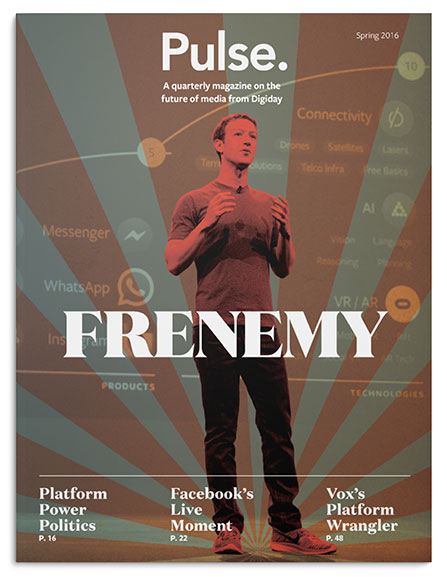 If you’re not “absolutely petrified” of FB’s empire-building tactics, you’re probably not paying attention says one publisher.
If you’re not “absolutely petrified” of FB’s empire-building tactics, you’re probably not paying attention says one publisher.
“Absolutely petrified.”
That’s how Neil Vogel, head of About.com, feels about the rise of distribution platforms like Facebook Instant Articles, Live Facebook, and Apple News, according to Lucia Moses in Digiday.
“And you should be,” Vogel continues. “There are all these platforms between you and your audience.”
Why the panic?
“About.com is in a vulnerable position; two-thirds of its traffic come from search,” Moses explains. “In his three years as the CEO of About.com, Vogel has seen the site lose traffic to Google and Facebook, and he can only speculate why.”
“Engagement goes up, down, and we don’t know why, other than, they’ve changed the algorithm,” Vogel notes. “The risk is, we figure it out, invest in it, and things change.”
And are things ever changing. As brands reinvent themselves and their teams to serve up video content for the voracious Live Facebook, the platforms gain ever more control as Facebook is “increasingly inserting itself into the publishing business,” Moses notes.
“To keep users lingering longer and coming back more often, Facebook needs publishers’ content. And they in turn are eager to figure out how they can take advantage of this growing dependency — even reconfiguring their organizations to do so,” Moses continues.
Publishers are giving them that content, because, well, it’s Facebook. What they are getting in exchange may not be worth the effort and expense. Publisher results from Instant Articles are tepid at best: traffic is dropping to participating brand sites; the promised data about users hasn’t been forthcoming on FB or Apple; and currently there is no model by which publishers can make money from videos.
Third party distribution looks to be a crapshoot at best, even a path to suckerdom as one industry voice puts it.
Publishers are faced with a terrifying decision: Be there or be invisible.
“More and more people are coming to your brand on the places that are most native to them,” Jonathan Hunt, who heads up Vox Media’s global marketing, said to Digiday. “For us, to not be there means we’re not seen, and the risk is you fall out of relevancy.”
For our part, we walked away from Facebook more than a year ago when we read the writing on the wall. After dutifully building a decent following there, we shut down our presence after Facebook started seriously limiting brand exposure. We didn’t leave in a huff; we made a strategic decision to walk away. We believed then, and we still do, that it should be up to the brand – not the platform – to decide who sees their messages. That’s Marketing 101.
As the distribution platforms begin to usurp the role of the publisher, they may find a backlash they never expected. But until brands feel enough pain to make that call, Mark and the rest will continue to build.
(BTW, this article is the cover story in Digiday’s new quarterly print magazine, Pulse. The print copies are gone for the Spring 2016 issue, but you can still sign up to download a PDF and get on board for the next issue. So far the magazine looks great; full of good content that takes a deep dive into the state of published media. Digiday in print…direct with no middlemen.)

October 5, 2016, 8:34 am